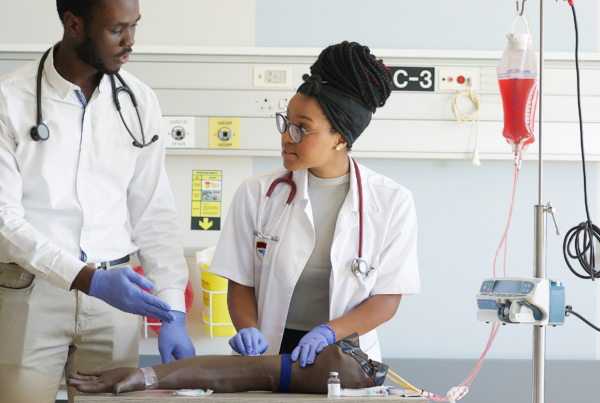Texas, a state with a diverse population, has a booming healthcare industry. This is why there is an increasing need for phlebotomy technicians. Becoming a Phlebotomy technician is less challenging than becoming a doctor or nurse. But, it still has specific requirements and regulations. This article will show you how to become a Phlebotomy Technician. You can also get a Phlebotomy license in Texas.
Phlebotomy License Requirements in Texas
| Key Takeaways: |
|
Phlebotomy License in Texas
The Requirements to Become a Phlebotomist in Dallas, Waco, TX & More
The requirements for becoming a phlebotomist differ based on different factors. These factors include the training provider, employer, or certifying agency. Highlighted below are the general requirements to become a phlebotomist in Texas:
Education
The first need is your education. To become a certified phlebotomist, you must have a high school diploma or equal. To become a Phlebotomist Technician, first, get a High School Diploma or GED.
Training
Becoming a Phlebotomist is much easier in Texas than in many other states. Phlebotomists can work in the field without training or certification. The state law does not need it. There are two routes you can take to become a Phlebotomist in Texas. There are two options available for training in this field. You can either take part in on-the-job training provided by employers. Or, you can choose to enroll in a formal training program.
Some employers are willing to train you to become a Phlebotomist. But, most employers prefer you to have prior training in the field as well as certificates. To begin Phlebotomy training in Texas, research Phlebotomy training schools in Texas. Choose the perfect one for you.
The quality of your phlebotomists can make or break your career. Consider the following factors before enrolling in a particular Phlebotomy training course.
Course Curriculum
It is important to check the course curriculum of a Phlebotomy course. Make sure it aligns with the exam for your career goals. Make sure it includes all necessary information for future phlebotomists.
The standard Phlebotomy course curriculum covers several areas:
- Basic human anatomy and physiology.
- Professional conduct.
- Stress management.
- Interpersonal and communication skills with patients and healthcare personnel.
- Interpersonal and communication skills with the public.
Requisitioning and the legal implications of their work environment are important. We collect, transport, handle, and process blood specimens for analysis. Understanding of the basic principles and new techniques in blood collection is crucial.
Hands-on Training
One of the first things to check at a Phlebotomy training school is their hands-on training. Reading books alone won’t suffice for drawing blood from patients. You must have hands-on training. There’s a much higher chance of you knowing something when you do it rather than reading it in a book.
Choose a training school that has instructors with extensive experience. These instructors will teach you practical skills for working as a phlebotomist. So, you will be able to attract well-paying employers. Avoid enrolling for Phlebotomy courses that only teach in class. Choose courses that give students practical experience also to classes.
Reviews
Another factor to consider when choosing a Phlebotomy training school is their reviews. Choosing a training school is easier when it has trained many students. The school should also have a history of graduating students. This indicates their past success and potential for future success.
Check the reviews of the school’s past students before making a final decision. Choose a reputable Phlebotomy training school that offers professional training. This will enhance your credibility in front of employers for certification.
Flexible Payment Plans
Some Phlebotomy schools fail when it comes to course payment plans for students. Students come from various backgrounds. It is important to consider what will benefit each student in the long run.
Payment plans should have the most flexibility. This allows those with the means to pay in full immediately. It also gives those unable to pay all at once an opportunity to clear their payments.
You will find schools that expect you to make all tuition payments at once before resumption. Some schools only need a payment for registration. They also let you pay half of your tuition later.
Background check
When you enroll in a Phlebotomy course, the school conducts a background check. The check is to verify that you’re who you claim to be and determine if you’re eligible for the Phlebotomy training.
To start training as a Phlebotomist, pass the school background checks. Additionally, there’s the employment background check for Alan. The background check for employment happens after completing certified employment.
Vaccinations
You need to show proof of immunization against specific illnesses. The vaccines included are hepatitis B, influenza, and COVID. Additionally, individuals must have a negative tuberculosis test. As a Phlebotomist, you draw blood from patients. This includes checking for vaccinations. It’s to ensure you’re protected.
Pass the National Certification Exam
Select a training school to qualify for the national certification exam. To take the certification exam, you must pass the phlebotomy class. Also, you need a completion certificate from the school.
Most Phlebotomy schools cover one attempt at the certification exam. Tuition fees vary. You may need to pay for the exam.
To get a phlebotomy license in Texas, you’ll need to meet some requirements
Requirements To Get a State Phlebotomy License in Texas
Phlebotomists in Texas need a high school diploma or GED. They must pass a typing test at over 25 wpm. They also must show computer and Microsoft Office skills.
Once you’ve completed a training program, you can become a Phlebotomist in Texas. But, if you want to go the extra mile and get certified, again, it’s not mandatory in all states, like Texas. There is still a possibility that this could change. Having a phlebotomy license puts you ahead of competitors in the field. The phlebotomy field is competitive.
Getting your Phlebotomy license will take an extra month or two. You must complete your Phlebotomy training first.
You must pass your final test with a 70% or higher score to become certified. Phlebotomy certification has many levels. Consider the license type you want. Phlebotomists have entry-level jobs, even in Texas. Yet, it may not remain that way in the future.
In the field, changes and growth will occur over time. As a result, the requirements for becoming a Phlebotomist have changed. Now, we need different levels of licensing.
Limited Phlebotomy Technician
As a limited phlebotomy technician, you can only retrieve blood through skin punctures. You can get this certificate by completing the standard phlebotomy training courses. It doesn’t need long hours of ‘hands-on’ training.
Phlebotomy Technician
As a phlebotomy technician, you can do skin punctures and venipuncture. To get a Phlebotomy license, finish 40 hours of classroom training. Then, complete 40 hours of hands-on clinical training. You can then apply for certification. When you apply for the certificate, you will need to complete and pass a written exam. The certification site gives the exam.
Phlebotomy Technician II
To become a phlebotomy technician II, you must first get a Phlebotomy license. To get the license, a licensed phlebotomist needs 1040 hands-on experience hours.
Frequently Asked Questions
How much does it cost to get certified in Texas for phlebotomy?
The cost of your examination is approximately $200. The cost can vary depending on the issuing organization. It may be lower in some cases. The certification exam offered by NAPTP costs $129. Yet, students from certain Phlebotomy schools take the exam for free. This is because it is already included in their tuition fees.
To get a phlebotomy certification Texas, you need to pay for the training course. Many phlebotomy training courses cost somewhere between $1000 and $3000. If you opt for an online course, you can receive your certification for only $500.
The cost is worth it. Don’t worry, demand for your services won’t go away soon. Boost employability with a certificate.
How long is phlebotomy school in Texas?
The duration of a Phlebotomy course in Texas depends on the type and school chosen for training. The length may vary. Depending on the qualification, it may vary from three to six months, with an average time to complete of 6 weeks.
The duration encompasses Phlebotomy lectures, practical sessions, and clinical experience.
What is the average pay for a phlebotomist in Texas?
The average Phlebotomist salary in Texas is $44,679, but the range falls between $34,540 and $42,825.
Salary ranges can differ based on location and key factors. These factors include education, certifications, skills, and years of experience.
What state pays phlebotomists the most?
The state that pays the most for Phlebotomists is California. Phlebotomists in the state earn an average salary of $48,070. This is higher than the national average of $37,380. But, it is lower than the average salary of all other occupations in the state, which is $68,510. The top 10% of phlebotomists in California earn a yearly salary of $61,060.
Phlebotomists employed in metropolitan areas in the states often earn more than average. Phlebotomy professionals in San Jose earn the best salaries, which amount to $56,940. In San Francisco, they earn $56,050, and in Santa Cruz, $53,880.
Where do phlebotomists make the most money in Texas?
Phlebotomists in Austin make the most with an hourly wage of $19.49. Dallas is a close second with a wage of $19.20 per hour.
Generally, the pay for Phlebotomists in Texas is good. Yet, it isn’t as high as that of California.
Does phlebotomy certification expire in Texas?
You can explore Phlebotomy Certifications and they need renewal every two years. Phlebotomists should start renewing credentials 30 days before they expire. This will help avoid delays.
Can I use my CA phlebotomy license in another state?
To transfer your CA phlebotomy license, ensure reciprocal certification in the other state. If not, you might need to get recertified. You may also have to complete extra courses. Additionally, you could have to get a license issued by the state you’re moving to.
What state pays the most for a phlebotomist?
California pays the most for Phlebotomists, with an average salary of $48,070. The top 10% of phlebotomists in California earn an annual salary of $61,060.
Are phlebotomists licensed in Texas?
Obtaining a Phlebotomy license isn’t a legal need in Texas for Phlebotomists. Yet, some employers may need you to get it. Enrolling in accredited training is crucial. Graduates can start working without certifications.
Obtaining certifications in your field is beneficial. Advanced certifications expand career prospects.
What is the highest-paid phlebotomist hourly pay?
Phlebotomist specialists in California’s metropolitan areas can earn $28.41 per hour. This is the highest pay for professionals in this field. Only a small percentage of Phlebotomists in the state earn this payment. Specialists, with varying levels of skill and years of experience, earn it.


